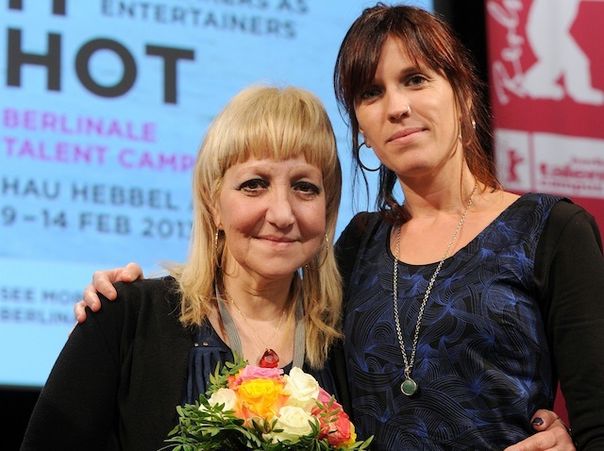Reality Meets Fiction
Over a coffee with Campus alumna Neus Ballús who made it to Berlinale Forum with her debut feature THE PLAGUE.

Catalan filmmaker Neus Ballús (right) with one of her protagonists, Maribel Martí, at the Campus Opening.
Over a coffee with Campus alumna Neus Ballús who made it to Berlinale Forum with her debut feature THE PLAGUE.
For the first time in the history of the Berlinale Talent Campus a former participant had the honour of showing her debut feature at the Opening Ceremony. THE PLAGUE, by Catalan director Neus Ballús, is also part of this year’s Berlinale Forum. The morning after the ceremony, Ballús and I met for a coffee and discussed how a former Doc Station participant ended up with a film in the official Berlinale programme.
THE PLAGUE interweaves the stories of five people living on the outskirts of Barcelona, all of whom are struggling with underemployment and general feelings of isolation and emptiness. Ballús started developing her project four years ago and filmed the first scenes after working on the script for two years. In 2011, she took part in the Berlinale Talent Campus' Doc Station, which gave her the encouragement she needed: “After working with my mentors I realised my project had universal appeal and could be interesting to international audiences. The Berlinale Talent Campus also opened new doors in terms of funding and we started to develop the project as a feature film.” Ballús explains, “The shooting was planned as if it was a feature films regardless of the fact that I was using the real-life situations of the non-actor protagonists.” She says her intention was “to use fictional tools in order to bring out deeper truths about her character’s real lives.” Ballús says that her work with the actors was a very personal experience, ”I had to get really intimate with them and have them believe in the film they were going to be a part of.”
In choosing to portray the underprivileged people at the base of society, Ballús says, “I was well aware of the trap of romanticising or overdramatizing their problems and chose to focus on the subtle realities of their existence.” She has done so by showing their feelings of loneliness, “I show them in deserted landscapes in the heat of the summer and let the suggestive images speak for themselves.” With THE PLAGUE, Ballús infuses reality with fiction in order to discover its invisible pulses, truthfully portraying the often misrepresented Other.

